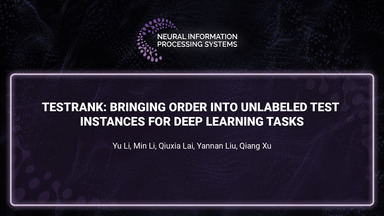A Unified View of cGANs with and without Classifiers
Dec 6, 2021
Speakers
Si-An Chen
Speaker · 0 followers
Chun-Liang Li
Speaker · 1 follower
Hsuan-Tien Lin
Speaker · 0 followers
About
Conditional Generative Adversarial Networks (cGANs) are implicit generative models which allow us to sample from class-conditional distributions. Existing cGAN works are based on a wide range of different architectures and objectives. One popular architecture in earlier works is to include a classifier during training with the assumption that good classifiers can help eliminate samples generated with wrong classes. Nevertheless, including classifiers in cGANs often comes with a side effect of only generating easy-to-classify samples. Recently, some representative cGANs avoid the side effect and reach state-of-the-art performance without having classifiers. Somehow it is not clear whether the classifiers can be resurrected to design better cGANs. In this work, we demonstrate that classifiers can be properly leveraged to improve cGANs. We start by using the decomposition of the joint probability distribution to connect the goals of the cGAN and classifier as a unified framework. The framework, along with a classic energy model to parameterize the distribution, justifies the use of classifiers for cGANs in a principled manner. In addition, it explains several popular cGAN variants, such as ACGAN, ProjGAN, and ContraGAN, as special cases with different levels of approximations. Experimental results demonstrate that the framework outperforms state-of-the-art cGANs on benchmark datasets, especially on the harder Tiny ImageNet.Conditional Generative Adversarial Networks (cGANs) are implicit generative models which allow us to sample from class-conditional distributions. Existing cGAN works are based on a wide range of different architectures and objectives. One popular architecture in earlier works is to include a classifier during training with the assumption that good classifiers can help eliminate samples generated with wrong classes. Nevertheless, including classifiers in cGANs often comes with a side effect of on…
Organizer
NeurIPS 2021
Account · 1.9k followers
About NeurIPS 2021
Neural Information Processing Systems (NeurIPS) is a multi-track machine learning and computational neuroscience conference that includes invited talks, demonstrations, symposia and oral and poster presentations of refereed papers. Following the conference, there are workshops which provide a less formal setting.
Like the format? Trust SlidesLive to capture your next event!
Professional recording and live streaming, delivered globally.
Sharing
Recommended Videos
Presentations on similar topic, category or speaker
The Future of Indigenous AI
Watch later
Total of 0 viewers voted for saving the presentation to eternal vault which is 0.0%
TestRank: Bringing Order into Unlabeled Test Instances for Deep Learning Tasks
Watch later
Yu Li, …
Total of 0 viewers voted for saving the presentation to eternal vault which is 0.0%
SIM2REALVIZ: Visualizing the Sim2Real Gap in Robot Ego-Pose Estimation
Watch later
Théo Jaunet, …
Total of 0 viewers voted for saving the presentation to eternal vault which is 0.0%
Spotlight Introduction 2
Watch later
Total of 0 viewers voted for saving the presentation to eternal vault which is 0.0%
Predicting Critical Biogeochemistry of the Southern Ocean for Climate Monitoring
Watch later
Ellen Park, …
Total of 0 viewers voted for saving the presentation to eternal vault which is 0.0%
The decomposition of the higher-order homology embedding constructed from the k-Laplacian
Watch later
Yu-Chia Chen, …
Total of 0 viewers voted for saving the presentation to eternal vault which is 0.0%





